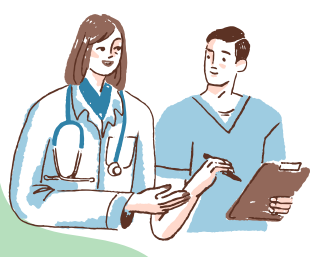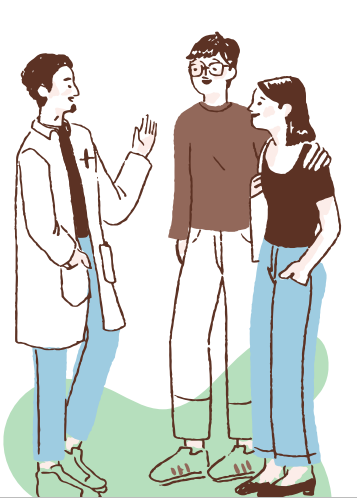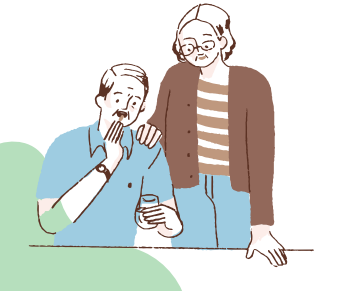ADHD
ATTENTION- DEFICIT HYPERACTIVITY DISORDER (ADHD)
What is ADHD?
Attention-Deficit Hyperactivity Disorder (ADHD) is a developmental disorder that begins in early childhood. The major characteristic of ADHD is a person’s inability to hold attention when they are not interested in what they are doing. This can manifest in forgetfulness, being unable to focus, or hyperactivity and acting out. ADHD impacts a person’s ability to complete tasks through higher-level cognitive skills such as
working memory and impulse control.

What causes ADHD?
People with ADHD have differences in their brain anatomy and function. The exact causes of ADHD aren’t known, but scientists attribute this condition to a combination of how someone’s brain works and their personal environment. Environmental factors like maternal smoking, drinking during pregnancy, premature birth and low birth weight may contribute towards the development of ADHD. Other environmental factors like toxins, home environment and early
childhood trauma can also cause changes in one’s brain development and function.

Symptoms of ADHD
- Children and adolescents suffering from ADHD are commonly inattentive, hyperactive, and struggle with academics at school. They do not have the same social skills as the rest of the children their age, are more physically active and have low working memory skills.
These symptoms cause low functional achievements, prevent educational progress, and create behaviours of concern. The symptoms may frustrate the children who, most of the time, do not understand what they are doing wrong as they are unaware of their difficulties.
Individuals with inattentive ADHD may exhibit the below symptoms:
- Often struggles to focus and concentrate on tasks or play activities
- Often reluctant to engage in tasks that require sustained effort
- Often easily distracted by extrinsic stimuli
- Often forgetful in daily activities
- Often has difficulty organizing tasks
- Often loses things necessary for tasks or activities
- Often fails to pay close attention to details
Individuals with hyperactive-impulsive ADHD may exhibit the below symptoms:
- Often fidgets and squirms more than others
- Often talks excessively
- Often interruptive during conversations
- Often is restless
- Often has difficulties waiting patiently in line
- Often reacts to situations quickly without considering the consequences
- Often searching for stimulation
- Often partakes in risk taking or dangerous behaviour
How is ADHD diagnosed?
The symptoms of ADHD must have lasted for over 6 months, been present before the age of 12 years and have caused serious impairment at school, at home and socially. In children, the diagnosis is usually made by a paediatrician (a doctor who specialises in children) or a child psychiatrist or psychologist. To diagnose ADHD in adulthood, it needs to be established that your symptoms began in childhood.
Helping Children with ADHD
The first step in caring for a child with ADHD is often to use positive parenting strategies. It can help to stick to a routine and help the child build their social skills. It would also be beneficial to talk to the school to plan an environment where the child can learn comfortably.
Below are some tips for caring for a child with ADHD:
- Maintain a routine
- Try to keep any instructions clear and brief
- Reward achievements and positive behaviour
- Try to have one-on-one time with the child doing something they enjoy
Raising Children with ADHD
Raising children with ADHD symptoms require patience and energy. It can sometimes result in parents blaming themselves for the inappropriate behaviours of their children, and it is important that parents share their feelings and experiences with friends, relatives, or a parent support group. Practical information about schedules and parenting skills is a valuable resource and may provide emotional support.
Treatment for ADHD
The National Institute for Health and Care Excellence (NICE) evidence review found that pharmacological treatment was more effective for reducing core ADHD symptoms, and non-pharmacological treatments were more effective for improving functional outcomes for people with ADHD.
Recommendation for the use of combined pharmacological and non-pharmacological treatments are based on the balance of availability, costs, preferences, values assigned to
consequences and resulting judgments. Non-pharmacological treatments can be combined with medication. If medication is not effective enough, non-pharmacological treatments can be
added to the treatment plan. Alternatively, if non-pharmacological approaches are tried first and functional impairment remains, medication can be added.
Pharmacological Treatment:
- Primary outcome: Symptom reduction
- Secondary outcomes: Improved functioning and wellbeing
Non-Pharmacological Treatment:
- Primary outcome: Improved functioning and wellbeing
- Secondary outcomes: Symptom reduction
What causes ADHD?
People with ADHD have differences in their brain anatomy and function. The exact causes of ADHD aren’t known, but scientists attribute this condition to a combination of how someone’s brain works and their personal environment. Environmental factors like maternal smoking, drinking during pregnancy, premature birth and low birth weight may contribute towards the development of ADHD. Other environmental factors like toxins, home environment and early
childhood trauma can also cause changes in one’s brain development and function.

Emergency Services
Emergency Services …… 000
Box Hill Hospital ……… 1300 342 255
The Royal Melbourne Hospital Parkville
(03) 9342 700
24/7 Mental Health Services
Beyond Blue …..… 1300 22 4636
Open Arms (Family counselling)…..1800 011 046
Kids Helpline ………………… 1800 55 1800
Lifeline …………………..… 13 11 14
Suicide Call Back Service………… 1300 659 467
General ADHD Support Services
Freedom is Within …………… 1300 399 618
ADHD Australia…………………… 02 9889 5977
2eHub ……………… https://2eHub.com.au
ADHD Support Australia ………https://www.adhdsupportaustralia.com.au
ADHD Melbourne ………… https://adhdmelbourne.com/
Dr. Tania Pietrzak and Associates Psychological services in Kew and Dandenong
Dr. Tania Psychological services specialise in assessing and treating neurodiverse clients. We offer friendly, affordable, comprehensive mental health care for clients of all ages across a range of diverse mental health issues.
We have three psychologists that can provide ADHD assessments, if this is something you are interested in, please contact us during office hours: Tuesdays – Fridays – 8:00 am – 8:00 pm.
To make a booking please visit
https://www.psychservice.com.au/or call 0398518200 or (Fax: 90178920)
References
- ADHD Guideline Development Group. Australian evidence-based clinical practice guideline for Attention Deficit Hyperactivity. Melbourne: Australian ADHD Professionals
Association. (2022). - Coghill, D. R. (2017). Organisation of services for managing ADHD. Epidemiol Psychiatr Sci, 26(5), 453-458.
- Jones, K., Baggott, R., & Allsop, J. (2004). Influencing the national policy process: the role of health consumer groups.
- Health Expect, 7(1), 18-28